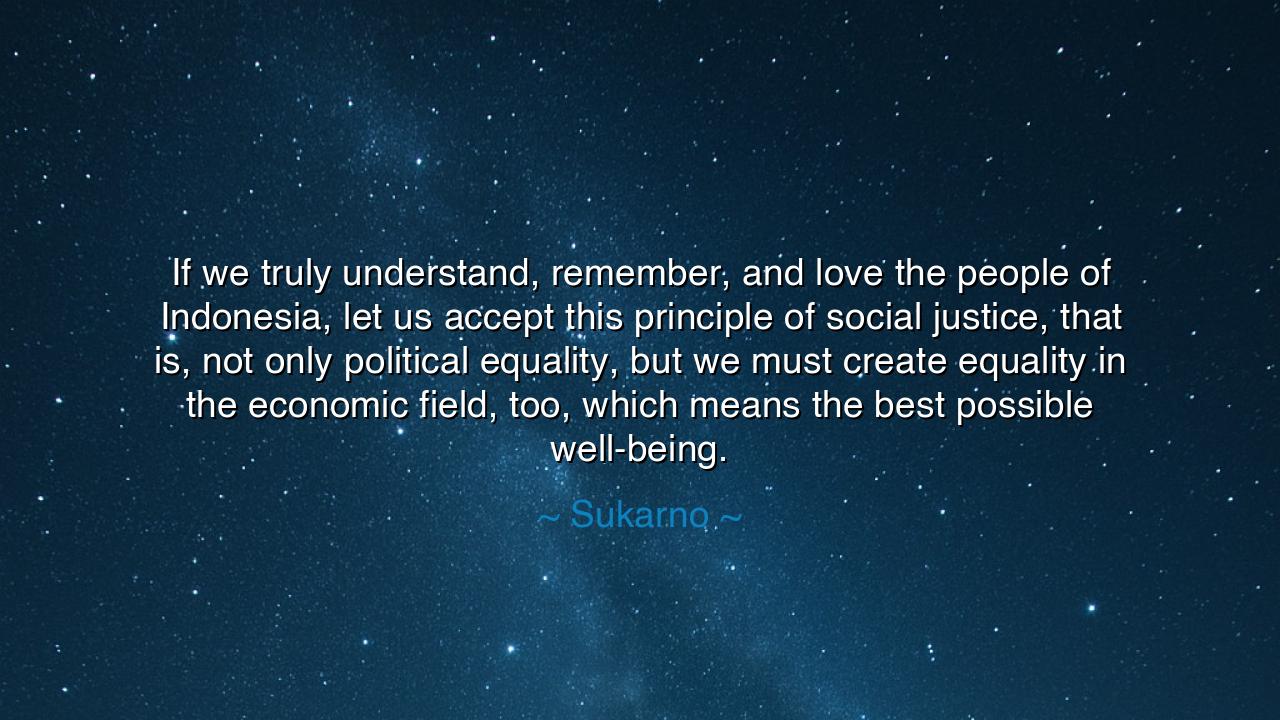
If we truly understand, remember, and love the people of
If we truly understand, remember, and love the people of Indonesia, let us accept this principle of social justice, that is, not only political equality, but we must create equality in the economic field, too, which means the best possible well-being.






In the ancient voice of the elders, let us meditate upon the words of Sukarno, the fiery soul who breathed life into the heart of a new nation. “If we truly understand, remember, and love the people of Indonesia, let us accept this principle of social justice, that is, not only political equality, but we must create equality in the economic field, too, which means the best possible well-being.” These are not mere words of governance—they are the echo of a spirit yearning for harmony among humanity. In them, the father of Indonesia spoke not only to his generation but to all who would inherit the earth: that love for one’s people must not be confined to sentiment or symbol, but must take form in justice, equality, and well-being.
Long before these words were spoken, the archipelago had known both glory and suffering. For centuries, her islands glimmered with gold and spice, yet her people labored under foreign chains. Sukarno, rising from that crucible, saw that independence without equality was but a mirage. To be free in name yet hungry in body was to remain enslaved. Thus he declared that the true test of love for the people lay not in grand speeches or flag-waving, but in economic justice, where no man stands so high that others must kneel to feed him.
Think, my children, of the farmers in Java who, after independence, still bent their backs to till land they did not own. Think of the fishermen in Sulawesi whose nets brought wealth to merchants far away but left their own children barefoot. These, Sukarno saw, were the forgotten warriors of independence. And so he called upon his people to continue the revolution—not with bullets and banners, but with compassion, reform, and solidarity. For political liberty was the birth; economic equality was the growth, the breath, and the enduring life of the nation.
There is a tale from those early years. In a small village near Bandung, a teacher named Ibu Kartini—named not after the noblewoman, but inspired by her—opened a school for children whose parents could not pay. When asked why she labored without salary, she said, “If I teach them letters, they will one day read the law. And if they read the law, they will know they have rights.” Her humble classroom became a seed of social awakening. That, my friends, is the meaning of Sukarno’s vision: not charity from above, but empowerment from within—the rising of a people who know their worth.
To understand, to remember, and to love—these three are the sacred steps of a nation’s conscience. To understand is to see the suffering of others not as distant tragedy but as one’s own wound. To remember is to carry in one’s heart the stories of struggle, the sweat of those who built the roads and planted the rice. And to love is to act—to shape a society where no one is forgotten, and every child has the right to hope.
Sukarno’s principle of social justice was not merely political doctrine; it was a spiritual command. He dreamed of a land where the humblest could walk beside the mighty, where wealth served the people, not the other way around. He knew that when one stomach is empty, no nation can truly be full. This is the eternal lesson of leadership: that prosperity without justice is but a golden chain, and freedom without compassion is but another form of tyranny.
Therefore, O listeners, take this wisdom into your days. In your work, do not seek greatness for yourself alone, but strive for shared well-being. In your home, teach your children not only to compete, but to care. In your community, lift the weary, feed the hungry, and remember that justice begins not in parliaments, but in hearts that dare to act. Let each deed, however small, become an offering to that ideal of equality which Sukarno held so dear.
And when the winds of the world grow cold and cynical, remember these words: love is the truest form of justice. For to love your people is to wish them not only liberty, but dignity; not only survival, but joy. Thus may we walk the path that Sukarno began—toward a land of light, where the spirit of social justice burns ever bright, guiding the generations to come.






AAdministratorAdministrator
Welcome, honored guests. Please leave a comment, we will respond soon